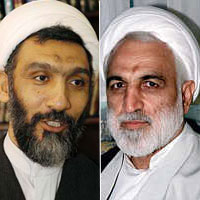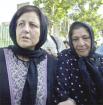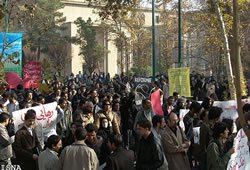

Saturday Dec. 17, 2005
The role of "Mostafa Pourmohammadi" the Minister of Interior in mass murdering of Iranian political prisoners in Iran during the year 1988, was approved by the office of the Ayatollah Montazeri .
According to the memoir written by Ayatollah Montazeri , Mostafa Pourmohammadi was the member of a three person delegate who have interrogated them and then executed thousands of political prisoners in the summer of 1988.
According to the opposition of the Islamic Republic the number of perisoners excuted were around 4481 person, but Ayatollah Montazeri put the number 2800-3800 .
In his memoir he stated:
while i was the deputy leader of the Islamic Republic , I protested to these executions: " It was the first of the month of " Moharam " , I asked Mr. Naieri (who was the judge in Evin prison), Mr. Eshraghi (who was public prosecutor), Mr. Raisi (who was the deputy public prosecutor) and Mr. Mostafa Pourmohammadi ( who was the representative of the ministry of information) to stop the execution of the political prisoners because it is the month of "Moharam"( A Shiiet holy month) , Mr. Naieri said: Upto now in Tehran we have executed 750 people , we have also separated 250 people who are still havent change their mind , we will finish them too......"
Link to this news in Farsi:
http://www.iran-emrooz.net/index.php?/news1/more/5829/*From Human Rights Watch :
Ministers of Murder: Iran’s New Security Cabinet In Iran, the newly appointed Minister of Interior, Mustafa Pour-Mohammadi (left), and Minister of Information, Gholamhussein Mohseni Ezhei, threaten to further intensify and expand repressive measures towards critics and dissidents.Pour-Mohammadi is implicated in grave human rights violations over the past two decades, possibly including crimes against humanity in connection with the massacre of thousands of political prisoners.
Iran: Top Ministers Implicated in Serious Abuses
(New York, December 15, 2005) – Iran’s new Minister of Interior is implicated in grave human rights violations over the past two decades, possibly including crimes against humanity in connection with the massacre of thousands of political prisoners, Human Rights Watch said in a briefing paper released today.
It’s completely unacceptable that men with such records would be serving in Iran’s government. They should be removed from their posts and investigated for these terrible crimes.
Joe Stork, deputy Middle East director at Human Rights Watch
Ministers of Murder: Iran’s New Security CabinetBackground Briefing, December 15, 2005
More Information on Human Rights in IranCountry Page
Free Email NewsletterContribute to Human Rights WatchHuman Rights Watch also said that the new Minister of Information should be investigated for his possible involvement in a dissident’s killing. The briefing paper,
Ministers of Murder: Iran’s New Security Cabinet, details credible allegations that Minister of Interior Mustafa Pour-Mohammadi and Minister of Information Gholamhussein Mohseni Ezhei were involved in extremely serious and systematic human rights violations over the past two decades. “It’s completely unacceptable that men with such records would be serving in Iran’s government,” said Joe Stork deputy Middle East director at Human Rights Watch. “They should be removed from their posts and investigated for these terrible crimes.” Iran’s cabinet is now dominated by former security and intelligence officials, Human Rights Watch said, raising fears that President Ahmadinejad’s government will readily resort to violence to suppress dissidents and punish critics. During Pour-Mohammadi’s tenure as top deputy of the Ministry of Information from 1987 to 1999, agents of the ministry systematically engaged in extrajudicial killings of opposition figures, political activists, and intellectuals. In 1988, the Iranian government executed thousands of political prisoners held inside Iranian jails. The deliberate and systematic manner in which these extrajudicial executions took place may constitute a crime against humanity under international law, Human Rights Watch said. Mustafa Pour-Mohammadi was a member of the three-person committee that ordered prisoners held in Tehran’s notorious Evin prison to their summary executions. From 1990 to 1999, Pour-Mohammadi was director of foreign intelligence operations in the Ministry of Information. During this period, dozens of opposition figures were assassinated abroad. In some of these cases the hand of the Iranian government has been well established, while in others there are credible allegations of government involvement. Pour-Mohammadi is at the center of strong allegations of direct involvement in orchestrating these assassinations. In 1998, agents of the Ministry of Information killed five prominent activist intellectuals in Tehran. An Iranian source with first-hand knowledge of the investigation told Human Rights Watch that Pour-Mohammadi was implicated by investigators in those killings and even that an arrest warrant was about to be issued for him. “But instead it was arranged that he leave his post in the Ministry of Information,” this source said. Gholamhussein Mohseni Ezhei, the new Minister of Information, served as prosecutor general of the Special Court for the Clergy and in this position spearheaded the prosecution of prominent reformist clerics. He has also been a key figure in suppressing press freedoms, resulting in the closure of more than 100 newspapers since 2000. Several journalists and activists have alleged that Mohseni Ezhei ordered the kidnap and killing of Pirouz Davani, a dissident and political activist, in 1998. Human Rights Watch called on President Ahmadinejad to relieve Pour-Mohammadi and Mohseni Ezhei of their duties immediately and to establish an independent mechanism to conduct a thorough and impartial investigation into their alleged crimes. If President Ahmadinejad fails to remove Pour-Mohammadi and Mohseni Ezhei from his cabinet, the Parliament should call for a vote of no-confidence and initiate its own independent investigation, Human Rights Watch said. “It’s downright dangerous to have men like this in charge of key ministries,” said Stork. “The international community must make clear that it holds the government of President Ahmadinejad responsible for the safety of Iranian political activists and dissidents.”
Link to this news:
http://www.hrw.org/english/docs/2005/12/15/iran12245.htmIRAN WATCH CANADA

 |
|



































